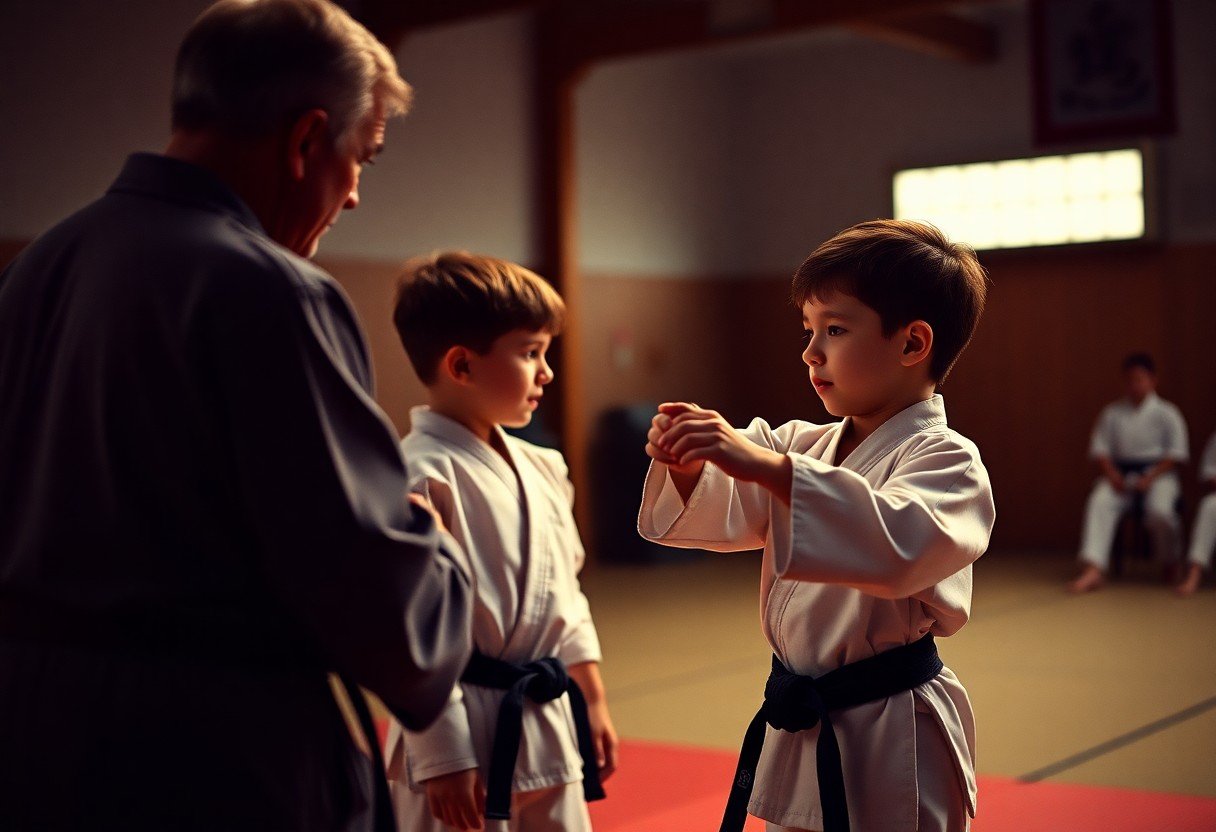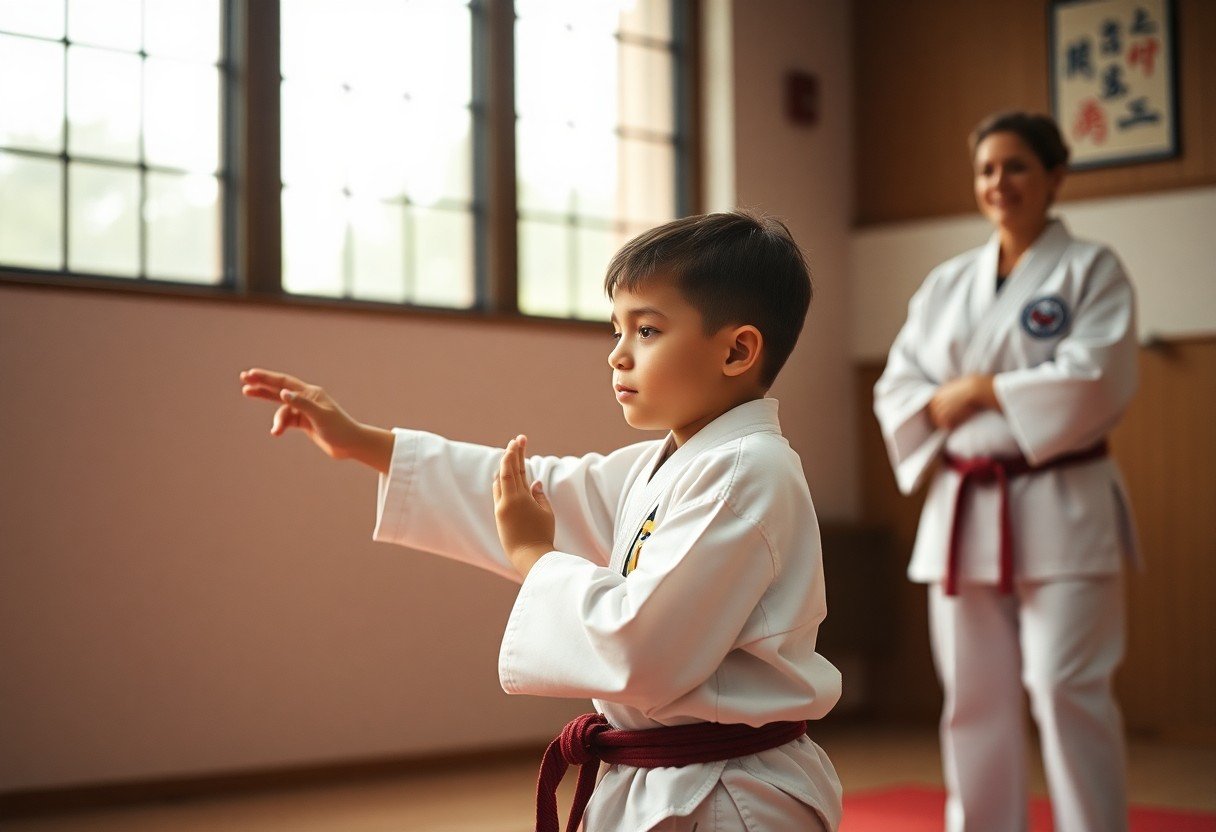Inspire your child to stay dedicated to martial arts by creating a positive and engaging environment around their practice. Emphasise the benefits of martial arts, such as increased confidence, discipline, and physical fitness, while ensuring they experience a sense of accomplishment. Set achievable goals together and celebrate their progress to instil a sense of pride and enthusiasm. Lead by example by demonstrating your own commitment to learning and growth, making martial arts a fulfilling journey that you can share together. With your support and encouragement, your child will be motivated to embrace their martial arts training wholeheartedly.
Understanding the Importance of Practice
While it’s natural to want your child to progress quickly in martial arts, understanding the importance of practice is key. Regular training helps build a strong foundation of skills, enabling them to execute techniques more effectively. Additionally, consistent practice fosters discipline and focus, traits that are beneficial both in and out of the dojo. By encouraging your child to embrace practice, you instil a sense of commitment and determination that will serve them well in all areas of life.
The Benefits of Martial Arts for Children
On launching on their martial arts journey, your child stands to gain numerous benefits. These include improved physical fitness, enhanced self-discipline, and greater confidence. The art of martial arts teaches respect and fosters camaraderie among peers. As they learn to set and achieve personal goals, your child will develop a strong sense of accomplishment, paving the way for success in various aspects of their life.
The Role of Consistency in Skill Development
While occasional practice may yield some progress, consistency is the secret ingredient for true skill development. Regular training sessions help reinforce techniques, allowing your child to master the movements with confidence. When you encourage your child to maintain a consistent schedule, they build muscle memory and technical proficiency, which are necessary for achieving higher levels in martial arts.
Another important aspect of consistency is its impact on your child’s mental resilience. By engaging in regular practice, they develop a strong work ethic and learn to persevere through challenges. This perseverance is especially vital in martial arts, where they will encounter difficult techniques and obstacles. The rewards of consistent training will ultimately lead to a sense of achievement, boosting their self-esteem and ensuring they remain motivated on their martial arts journey.
Identifying Motivation Factors
You can effectively encourage your child by identifying their specific motivation factors. Consider the following aspects:
- Personal interest in martial arts
- The desire to build confidence
- Social connections and friendships
- Achieving goals and recognition
The more you understand what drives your child, the more you can support them in their journey. For additional insights, check out How to Motivate Your Child in the Martial Arts.
Setting Personal Goals
To keep your child engaged in martial arts, it is important to help them establish personal goals. These goals can be small and achievable, or larger objectives that inspire ongoing commitment. Discuss with your child what they would like to accomplish, whether it’s mastering a specific technique or earning a new belt.
Recognising Milestones and Achievements
The process of recognising your child’s milestones and achievements can significantly boost their motivation. Celebrate their progress, of any size, to showcase their dedication and hard work.
Plus, acknowledging milestones like earning stripes or mastering a challenging technique can instil a sense of pride and accomplishment in your child. This recognition not only reinforces their motivation to continue but also builds a strong foundation for positive self-esteem. Ensure you highlight these achievements, as they serve as a testament to their effort and commitment in martial arts.
Creating a Supportive Environment
The key to motivating your child to excel in martial arts lies in creating a supportive environment. Ensure that your home is filled with encouragement and positivity. Engage with their training by showing interest, attending classes, and celebrating their achievements. You can further explore strategies on how to motivate martial arts students to keep training by visiting this helpful guide.
Encouraging Family Involvement
There’s immense value in having your family involved in your child’s martial arts journey. By participating in classes or attending competitions together, you not only reinforce their commitment but also create lasting memories. Family support can boost your child’s confidence and determination, making training more enjoyable and fulfilling.
Building a Positive Training Atmosphere
You should focus on fostering a positive training atmosphere where your child feels safe and motivated. Comfort breeds confidence and encouragement from peers and instructors is vital for growth. Providing constructive feedback and celebrating even the small victories can make all the difference. Additionally, establishing a routine that involves practice at home can enhance the excitement around martial arts training and nurture a passion that will keep them engaged long-term.
Creating a nurturing atmosphere involves not just a physical space but also an emotional backdrop where your child feels empowered and inspired. Encourage friendships among fellow students, as camaraderie can significantly enhance the training experience. Introduce fun practice sessions or challenges at home to break monotony and keep the enthusiasm alive. Emphasising the joy of learning and the friendships formed through martial arts will help your child build a lasting connection with their practice.
Effective Communication Strategies
Keep the lines of communication open with your child to foster a positive environment for their martial arts journey. Engaging in regular conversations about their experiences, feelings, and challenges will enhance their motivation to practise. Show genuine interest in their progress and let them know your support is unwavering. This will help your child feel valued and empowered as they navigate their martial arts path.
Listening to Your Child’s Needs
Any effective communication strategy begins with listening to your child’s needs. It is important to understand their motivations, struggles, and aspirations within martial arts. By fostering a supportive atmosphere, you encourage them to express their feelings freely, which can provide significant insights into how you can best motivate them.
Providing Constructive Feedback
If you want to bolster your child’s confidence, aim to provide constructive feedback during their training. Focus on their achievements while gently pointing out areas for improvement. Highlighting what they did well will reinforce their positive behaviour, making them more receptive to suggestions for growth.
Plus, it’s imperative to ensure your feedback is specific and actionable. When mentioning areas for improvement, pair your suggestions with examples from their practice. This creates a balance that promotes learning and growth, making your child eager to apply your insights. Additionally, ensure to celebrate their strengths to create a supportive environment where they feel motivated and capable to improve, driving their commitment to practice martial arts consistently.

Using Rewards and Incentives
Despite the importance of intrinsic motivation, rewards and incentives can be powerful tools to encourage your child to keep practicing martial arts. By recognising their efforts with small tokens or privileges, you can create a positive reinforcement system that makes training more enjoyable. This approach can help sustain their enthusiasm and commitment over time, ensuring they stay engaged with their martial arts journey.
The Role of Rewards in Motivation
The use of rewards plays a significant role in enhancing motivation by providing immediate feedback for your child’s efforts. By acknowledging their achievements, whether big or small, you can foster a sense of accomplishment that drives them to improve further in their martial arts practice.
Balancing Rewards with Intrinsic Motivation
While rewards can encourage continued participation, it’s important to foster intrinsic motivation to ensure a lasting passion for martial arts. A balance between external rewards and internal drives will help your child develop a genuine love for the practice.
A healthy approach to balancing rewards with intrinsic motivation is vital. You want your child to appreciate martial arts not just for the rewards but for the skills they develop and the discipline they cultivate. Encouraging them to set personal goals and recognise their progress fosters a sense of ownership in their practice. By combining both external incentives and personal satisfaction, you can create an environment where your child thrives and enjoys their martial arts journey, ultimately leading to true dedication and success.
Incorporating Variety and Fun
Unlike traditional training methods that can become monotonous, incorporating a range of activities in your child’s martial arts practice can significantly enhance their enthusiasm and commitment. By varying drills, integrating games, and introducing different martial arts styles, you can create an engaging environment that keeps your child excited about training and helps them develop various skills.
Engaging Activities to Keep Interest High
Interest in martial arts can wane when routines become predictable. By introducing fun, dynamic activities such as obstacle courses, partner drills, and themed training sessions, you can effectively maintain your child’s enthusiasm and encourage consistent practice. Incorporating elements such as friendly competitions or martial arts-themed games can create a sense of excitement and motivation.
The Importance of Play in Learning
Assuming you want your child to thrive in their martial arts journey, it’s important to recognise the value of play in their development. Play fosters creativity, problem-solving skills, and physical coordination, all of which are vital in martial arts. You can enhance learning by integrating playful elements into training, making it enjoyable while still being instructional.
Incorporating play into your child’s martial arts practice not only enhances their overall experience but lays the foundation for effective learning. Through playful interactions, children develop important motor skills and gain a sense of teamwork, which is particularly beneficial in martial arts. The positive effects of engaging in fun activities help to alleviate the pressure of performance, allowing your child to approach their training with a lighter heart. Ultimately, adding elements of play can produce a more well-rounded martial artist who enjoys their journey.
To wrap up
Now, to motivate your child to keep practising martial arts, create a supportive environment that celebrates their progress and achievements, no matter how small. Engage with them in conversations about their goals and interests within the discipline, encouraging their personal connection to the sport. Additionally, you can introduce fun challenges or family activities that incorporate martial arts elements. By demonstrating enthusiasm and participation, you’ll help foster a lasting passion for martial arts in your child, ensuring they remain committed to their training.
FAQ
Q: How can I encourage my child to attend martial arts classes regularly?
A: One effective method to encourage regular attendance is to establish a consistent routine. Create a schedule that includes martial arts classes as a regular part of your week, ensuring your child knows when and where they will be training. Additionally, make the class exciting by allowing your child to invite a friend along, which can make the experience more enjoyable and motivate them to go more often.
Q: What can I do if my child shows signs of losing interest in martial arts?
A: If your child appears to be losing interest, it might be helpful to have an open conversation with them about their feelings. Learn what aspects of martial arts they enjoy and what may be causing their disinterest. You can also encourage them to set personal goals, such as achieving a new belt or mastering a particular technique. Celebrating small accomplishments can reignite their passion and sense of achievement.
Q: How should I handle my child’s frustration with challenging techniques or skills?
A: It is important to acknowledge your child’s frustrations and remind them that learning new skills takes time and effort. Offer words of encouragement and emphasise the importance of perseverance. You might also consider arranging extra practice sessions at home, where they can learn at their own pace, without the pressure of the class environment. This can help build their confidence and reduce feelings of frustration.
Q: How can I make martial arts more appealing for my child?
A: To make martial arts more attractive, you could enhance the experience by incorporating fun elements. Consider arranging social events with their classmates, such as movie nights or themed parties. Also, try to connect the discipline of martial arts to other interests outside of practice, such as watching martial arts films or reading about famous martial artists, which can inspire and engage their enthusiasm for training.
Q: What role does positive reinforcement play in motivating my child to practice martial arts?
A: Positive reinforcement is a powerful tool in motivating children. Praise your child for their efforts and achievements, big or small, to help them associate their training with positive feelings. You could also establish a reward system, where they earn points for attending classes or practising at home, which can be exchanged for a treat or activity they enjoy. This not only keeps them motivated but also reinforces the behaviour you want to encourage.



